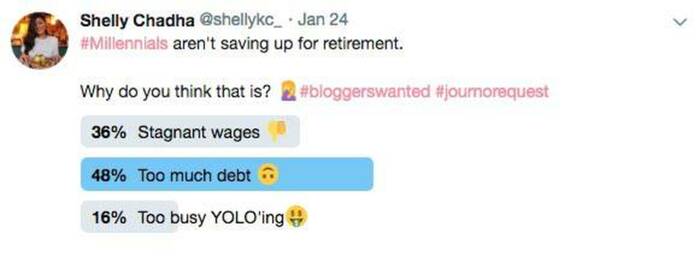
“Millennials are narcissistic, unambitious, entitled, and uneducated” are but a few of many stereotypes that have been ascribed to the scrutinised generation in recent years. But new findings have predicted that Millennials will surpass the population of their beneficiaries Gen Z in 2019. So, is it not perhaps too simplistic to brandish such labels across nearly 30% of the entire world’s population?
Millennials are the most publicised generation in history and are frequently criticised for exhibiting unconventional behaviour and for negatively impacting their contributions to modern society. Especially, when it comes to money. I discuss some of these myths in part one of ‘Exposing Millennial Money Myths’, but felt that such an important topic needed closer examination, and decided to continue the discussion with myth number four!
The more I engaged in discussions of this nature, I found that the attempts to validate its truth were consistently thwarted. But is this the case for all Millennial money stereotypes? Or are Millennials really as bad as people want to think they are?
Myth 4. Millennials are choosing not to save for retirement.
Millennials are challenging social norms, re-structuring the workplace, and getting married later than previous generations. And whilst people are questioning why this is, another big question on everybody’s lips is: why are they choosing not to save for retirement?
Findings released by Merrill Edge suggest that Millennials are actually "outperforming everyone in saving,". So, if they’re saving, and it’s not for retirement, then what is it for?
Well, in reference to the same study, the majority of Millennials (63%) have been revealed as prioritising their money savings towards reaching their desired lifestyle goals and executing a durable plan for financial independence, alternatively to building their pensions fund. Many Millennials were brought up by married parents who sacrificed a lot and worked tirelessly to save up sufficient funds for their retirement, and Millennials are hesitant to follow in the same footsteps.

The future of social security is unclear. Pensions are vanishing. And student debt is at an all-time high. So, it is not shocking to find that their goals for the future may have changed. And yes, whilst this may be seen as un-traditional and ‘going against the grain’, who’s to say that it’s wrong? I took the debate to Twitter and discovered the following:
• 16% blamed their ‘YOLO’ (you only live once) lifestyles, 36% of voters blame stagnant wages for Millennials not saving for retirement, and 48% blame ‘too much debt’.
With this in mind, let’s take a look at what other people have to say:

“They ride huge cars and stay in expensive hotels at the expense of investing.”
It is of common opinion that Millennials are trying to maintain a lifestyle that does not comply with their financial realities. That the majority of Millennials are either jobless, poorly paid, or swamped with student debt, and yet still consciously choose to spend recklessly. But is it all just petty gossip?
Research conducted by Strutt & Parker revealed that Millennials could save £64,000 each year if they just reduce their spending on little luxuries, such as nights out, buying sandwiches, and holidays. The Money Advice Service also found that Millennials are spending an average of £6,589 a year on nights out!
Dalene Ekirapa is a fashion, travel, and lifestyle blogger who believes that Millennials pursue lives of luxury and as a result, forget to even save up. She doesn’t say that there is anything wrong with that, but hints that smart financial decisions such as investing should be considered first in order to appreciate the reward:
“Unfortunately, millennials are living their lives largely and even forget to save up. They ride huge cars and stay in expensive hotels at the expense of investing. Not that living life is bad, but this should come in as appreciation of what you’re doing. I mean, save, invest, give back and have fun!”
On the other hand, it should be noted that millennials are frequently quoted as being the poorest generation for decades. Annual wages are £760 lower than they were a decade ago, and Millennials have been affected the worst by this. The average wage was £24,088 in 2008, and now, ten years later, there has now been a 4.6% cut to £21,408. This poses the question if they can even afford to put money away for retirement, let alone invest?
What’s more, it is regularly communicated that they have to keep up with expenses that previous generation didn’t. The entertainment industry has advanced enormously, the housing market has plummeted, keeping up appearances is more relevant due to social media pressures, and modern society cannot function without mobile phones. So, whilst some people may perceive the Millennial experience as luxurious and excessive, perhaps for Millennials, it is just the way of their world; a means to survive.
“There’s so much to think about in the present that the future seems a little far out.”
Money is a major stressor for a lot of people, with 77% of UK residents revealing that they are overwhelmed with stress, particularly by their financial situation. It was also found that UK Millennials are twice as likely to stress over money than the Baby Boomers.
In fact, a study carried out by MoneyBox on 2,000 UK Millennials, reveals that 55% of Millennials do not actually have a financial plan in place for the future and that 90% wish that they had received better financial education whilst at school.
So, could it be that Millennials are just not as well-equipped to deal with these stressors due to inadequate life experience and limited financial literacy? Has being a part of the ‘less money, more problems’ generation lifted their capacity to deal with their financial management and its accompanying stress effectively?
Teral, a Millennial UK fashion blogger, hints at this in the following comment. She touches on the Millennial struggle to juggle different financial responsibilities at the same time, and how it is difficult to see beyond a single financial goal:
“I think a lot of millennials don't even think about retirement. There’s so much to think about in the present that the future seems a little far out. Speaking on behalf of myself, my first priority is to save for my own property, once I'm secure in that sense, then I can think about a retirement plan.
The retirement dilemma
A Royal London report suggests that millennials will need to save £260,000 for retirement. So, I did a little research to see if this would be feasible for the average renting UK Millennial.
Based on the above statistic, the average 30-year-old will have to save around £7,428 a year to retire with £260,000 at 65 years old. However, with the average salary of a 30-year-old being £23,700 in the UK in 2017, and average monthly rent being £921 across Britain, this will leave under £1000 left for other monthly living expenses. To reach savings of £7,428 a year, this would mean this Millennial would have to sacrifice £619 of their remaining monthly salary to put towards retirement, which leaves living expenses to a minimal amount of around £350.
In light of this, one should refrain from assuming that Millennials are consciously choosing not to save for retirement as it is more likely to do with the fact that they simply can’t afford to.
Myth 5. Millennials care more about keeping up appearances than being financially savvy.
Millennials are also frequently labelled as a ‘me, me, me’ generation, and have been criticised for overspending and reimagining ‘keeping up with the joneses’. If you are not familiar with this idiom, it refers to one’s desire to own material things and live a certain lifestyle to match one’s neighbours and friends in their spending and social standing – a term that has recently been ascribed to Millennial behaviour.
A recent report from Credit Karma actually revealed that "nearly 40 percent of millennials have spent money they didn't have and gone into debt to keep up with their peers.", so, is keeping up with the joneses a real thing? Do they care more about keeping up, even if it means their bank balance is going down?
“I do think millennials feel a certain online pressure that older gens won’t understand.”
Millennials are often perceived as a generation that strives for perfection with 94% of them reporting that they are making personal improvement commitments and constantly feel under pressure to meet high standards. A study by Thomas Curran and Andrew Hill has likened this feeling to “multidimensional perfectionism”, which is a principle held that perfection is achievable, and is characterised by a refusal to accept anything short of it. They also point out a correlation between this experience and a mounting number of eating disorders, depression, and anxiety-related disorders amongst Millennials.
Research of this nature incites a range of different opinions and comments. Whilst some people blame tough economic conditions, the majority of people blame social media pressures and condemn its negative influences on Millennial spending behaviour. But does this ring true?
A study revealed that 47% of millennials spend up to four hours a day on social media, and that 38% of them had bought something they saw after their time spent on there. This suggests that social media can actually makes you spend more. What's more, 41% of the same cohort said that FOMO (fear of missing out) contributed to their social shopping behaviours. Whilst this might seem absurd to a lot of people, it is important to consider the world of which the Millennials were born into. Millennials did not know a life before social media and dealing with its influences has evidently brought about its own accompanying set of offenses.
The Weekend Tourist reminds us that Millennials were not brought up in the same world as their predecessors and as a result, they have adjusted to their own set of norms and values. The most notable, being social media:
“Millennials are also known as the i-generation, those that grew up in the internet age, they don’t know of a time without it. Perhaps they are more affected by FOMO and portraying the Instagram lifestyle – just like the example of my friend who ended up paying £500+ for a three-day weekend in Marbella in a luxury villa and attending glamorous beach parties as a hen-do. Principally, because they wanted the ‘grams for the grid.“
“This is not a generational problem, it is a people problem.”
It is also important to recognise that social media is not the only factor that influences one to spend money on keeping up appearances, and it is not only Millennials that do so. Boomers also put ‘keeping up with the joneses’ into effect -they just didn’t have social media to flaunt this lifestyle. They buy more new cars than any other generation and are frequently classified as the ‘biggest spenders’. So, is it not more of a people problem?
Michael Outar, from Savebly reinforces this perspective. He emphasises that ’keeping up with the joneses’ is not a new term, and originated before Millennials were even a thing:
“It is no secret that social media has affected Millennials in numerous ways but the same can be said for other generations. There definitely are Millennials who rather portray a glamorous lifestyle on social media than making smart financial decisions but not all. The fact is this is a problem that has been around for ages, it is called “keeping up with the Joneses” or better yet “beating the Joneses”. This is not a generational problem, it is a people problem. Millennials are getting the heat for this old mindset because it is out for the world to see but older generations had this similar mindset. They bought fancy cars, big houses, and expensive clothes to show off to friends and family. There are Millennials that are doing the same on social media because at the end of the day people just want to feel accepted. So, yes Millennials are chasing social media fame, but they also realize the reward that can come with it. There are people on YouTube, Instagram, Facebook, etc.… making a lot of money for being influencers and some Millennials see these platforms as good business opportunities.”
Jaime, from Keep Thrifty takes a similar standpoint. She hints that social comparison itself is not a new thing, and that this type of behaviour is evident in all generations:
“I don't believe millennials care any more or less about this than other generation. Social media is full of people of all ages portraying their best selves, their best lives, and their best images - often hiding the messy details of what life really looks like. That said, the concept of "showing your best self" isn't that different from other ways we see this manifested in society - such as men who insist on driving expensive cars or women who refuse to go to the grocery store without a full face of makeup. We all are creatures that focus too much on outward appearances and in many cases that focus is a financial trade-off.”
Food for thought
With temptations around every corner, added-on social media pressures, and the economy toughening, Millennials are doing the best they can to adjust. Maybe it’s time to take a step back and give Millennials a break because such criticism is a lot to carry for one generation. Let’s not forget that each individual has their own individual set of hopes, fears, and dreams, and this makes it hard to compares one person from the other, let alone, different generations.
We’ll be taking a better look into this in part three!